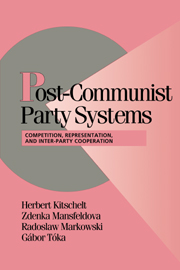Book contents
- Frontmatter
- Contents
- List of Figures and Tables
- Acknowledgments
- Introduction: Democracy and Party Competition
- Part I Theory: Party Systems and the Procedural Quality of Post-Communist Democracy
- Part II Setting and Research Strategy
- Part III The Structuring of Party Competition
- 5 Programmatic Citizen-Elite Linkage Strategies across Post-Communist Polities
- 6 Linkage Strategies within Party Systems: Diversity among Parties
- Part IV Political Alignments and Dimensions of Competition
- Part V Political Representation and the Quality of Democratic Governance
- Conclusion
- Appendix I List of Political Parties and Electoral Alliances
- Appendix II Questionnaire for the Elite Study
- Appendix III Population Survey Questions (Policy Opinions)
- Bibliography
- Index
- More Titles in the series
5 - Programmatic Citizen-Elite Linkage Strategies across Post-Communist Polities
Published online by Cambridge University Press: 05 June 2012
- Frontmatter
- Contents
- List of Figures and Tables
- Acknowledgments
- Introduction: Democracy and Party Competition
- Part I Theory: Party Systems and the Procedural Quality of Post-Communist Democracy
- Part II Setting and Research Strategy
- Part III The Structuring of Party Competition
- 5 Programmatic Citizen-Elite Linkage Strategies across Post-Communist Polities
- 6 Linkage Strategies within Party Systems: Diversity among Parties
- Part IV Political Alignments and Dimensions of Competition
- Part V Political Representation and the Quality of Democratic Governance
- Conclusion
- Appendix I List of Political Parties and Electoral Alliances
- Appendix II Questionnaire for the Elite Study
- Appendix III Population Survey Questions (Policy Opinions)
- Bibliography
- Index
- More Titles in the series
Summary
In the early phase of post-communist democratic party competition, legacies of the old regime constitute more powerful constraints or facilitators of programmatic competition than the new democratic institutions by themselves. According to this logic, among our four cases, we expect the strongest programmatic crystallization in the Czech Republic, a formerly bureaucratic-authoritarian regime. Programmatic crystallization may be weaker in Hungary where a negotiated regime transition against the backdrop of a national-accommodative communist regime makes it difficult for parties to develop clear programmatic profiles on salient socio-economic issues. Poland may be situated somewhere in between these two countries, combining an essentially national-accommodative communist regime whose ruling party toward the end embraced market and democratic liberalization with a transition process characterized by both negotiation and confrontation between an old ruling party and new challengers. Overall the least programmatic structuring we expect in Bulgaria where a weak and divided liberal-democratic political sector and a comparatively popular, but programmatically disorganized post-communist party emerge from the ruins of patrimonial communism.
In this chapter, we explore the empirical plausibility of these claims, but also confront an argument that runs counter to our explanation of cross-national diversity in the programmatic crystallization of party systems. Is it not simply the fragmentation of party systems that covaries with greater or lesser programmatic crystallization? Let us first, however, introduce four measures that bear on our assessment of programmatic crystallization in post-communist democracies.
Information
- Type
- Chapter
- Information
- Post-Communist Party SystemsCompetition, Representation, and Inter-Party Cooperation, pp. 157 - 194Publisher: Cambridge University PressPrint publication year: 1999
